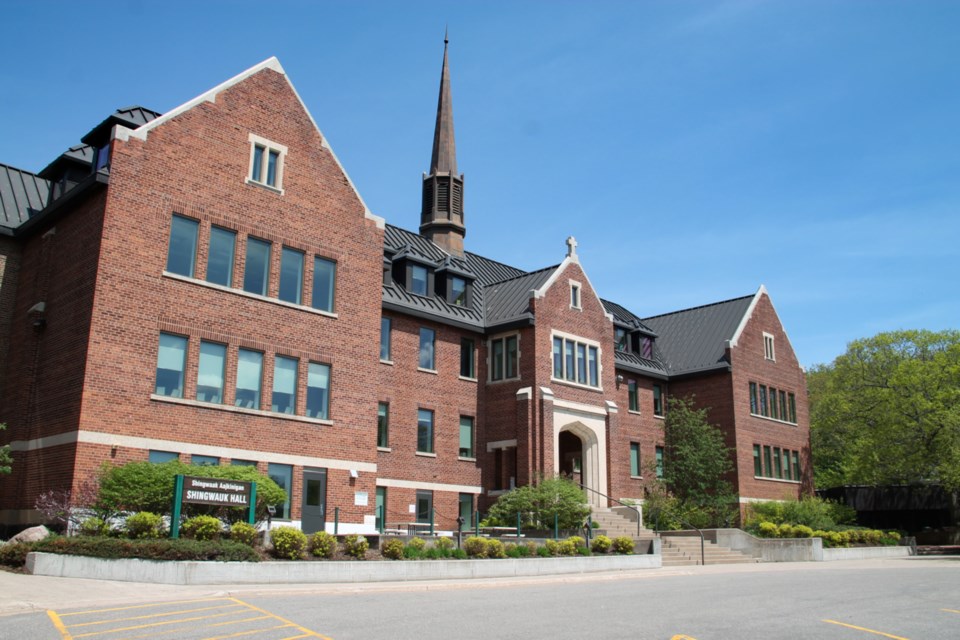Algoma University is getting set to host a delegation of Indigenous and Afro-Colombian leaders in Sault Ste. Marie.
The delegation is part of collaborative efforts to "deepen commitments to decolonization, diplomacy among diverse peoples and peace-building," the university said in a news release.
The effort is in partnership with the University of British Columbia, the Global Center for Pluralism, the University of Toronto, and the Canadian Association of Latin American and Caribbean Studies (CALACS).
It is also in collaboration with NORDIK Institute, Shingwauk Kinoomaage Gamig (SKG), the Robinson-Huron Treaty Chiefs, the Institute for Territories, Peoples, and Pedagogies for Peace, the African Caribbean Canadian Association of Northern Ontario (ACCANO), the Mukwa Waakaa’igan project and the university's Faculty of Cross-cultural Studies.
As part of Algoma University’s "special mission," and expanding on a decolonial educational strategy, the delegation will meet with Robinson-Huron leadership, First Nation community members, members of the African-Caribbean community and students, faculty, staff and other members of the university community, according to the release.
The delegation involves efforts to support nation-to-nation diplomacy, inter-cultural and decolonizing approaches to education and peace-building, as well as to strengthen efforts in the areas of environmental justice that centre the perspectives of Indigenous and Black-Afrodiasporic people across Abya Yala (the Americas), the university said.
The delegation consists of social leaders and high-level Indigenous and Afro-Colombian dignitaries.
They include Leyner Palacios Asprilla, an Afro-Colombian social leader who acted as Truth Commissioner in the Colombian Commission for the Clarification of Truth, Co-existence and Non-repetition, the Hon. Belkis Izquierdo Torres, Indigenous (Arhuaca) Vice-President of the Special Jurisdiction for Peace, Clemencia Herrera, Director of Education of the National Indigenous Organization of Colombia as well as Baltazar Mecha Forastero, Coordinator of the Indigenous and Afro-Colombian Educational Program at the Technological University of Chocó.
Indigenous (Arhuaca) Elizabeth Garcia (Ambassador of Colombia to Bolivia) will also be joining virtually, a lead voice in efforts to build diplomacy among peoples, across Indigenous Nations and Afrodiasporic peoples, the university said.
“As part of its commitments to reconciliation and cross-cultural education, Algoma University is honoured to welcome the Colombian delegation of Indigenous and Black Afro-descendant leaders,” shared President and Vice-Chancellor Asima Vezina.
“We recognize this group has committed their lives to peace-building; working bravely to address the injustice, oppressive and violent outcomes of colonization. We welcome the opportunity to understand more deeply how they are approaching this important work through cultural practices and the assertion of self-determination. As we consider our focus on social impact, Algoma is currently expanding programming and opportunity for Global interactions, cultural exchange and student/faculty mobility. This is part of our commitment to decolonial education and our efforts to learn from and with each other as we strive for a better world. We are grateful to the Colombian delegation for visiting, sharing and relationship building and we look forward to furthering this important work together," Vezina said.
The delegation is part of a larger triangulated strategy on decolonial education between Canada, Colombia, and Bolivia, with new partnerships being created internationally, including in various African countries, supported through the work of the Institute of Peoples, Territories and Pedagogies for Peace.
The delegation is working with Indigenous/First Nations, Afro-diasporic leadership, educational and research institutes, embassies, MMIW leaders, land defenders, victims’ rights and solidarity groups in Canada, to exchange perspectives on issues of self-determination, land/water defence, peace, truth and reconciliation, reparations, colonial violence against women, as well as cultural approaches to disappeared peoples and the identification of gravesites.
As part of this delegation, a panel discussion titled, “Decolonizing and Intercultural Education for Peace and Environmental Governance” will take place at Algoma U on Sunday, June 4, at 7 p.m. This is a hybrid event and is open to the public. (Find more info at this link.) There will also be a speaker series titled, “Colombian Indigenous Perspectives on Peace and Education” taking place via Zoom on Tuesday, June 6 at 9 a.m. (More info at this link.)
